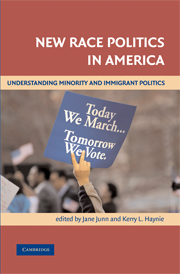Book contents
- Frontmatter
- Contents
- Contributors
- Acknowledgments
- 1 New Race Politics: The Changing Face of the American Electoral Landscape
- 2 In Whose Interest? Political Parties, Context, and the Incorporation of Immigrants
- 3 Beyond Black and White: The Experiences and Effects of Economic Status among Racial and Ethnic Minorities
- 4 Activity amid Diversity: Asian American Political Participation
- 5 Get Me to the Polls on Time: Coethnic Mobilization and Latino Turnout
- 6 Se Habla Espanol: Ethnic Campaign Strategies and Latino Voting Behavior
- 7 Structuring Group Activism: A Macro Model of Black Participation
- 8 Black Elites and Latino Immigrant Relations in a Southern City: Do Black Elites and the Black Masses Agree?
- 9 Understanding the New Race Politics: Conclusions and Challenges
- References
- Index
3 - Beyond Black and White: The Experiences and Effects of Economic Status among Racial and Ethnic Minorities
Published online by Cambridge University Press: 05 September 2012
- Frontmatter
- Contents
- Contributors
- Acknowledgments
- 1 New Race Politics: The Changing Face of the American Electoral Landscape
- 2 In Whose Interest? Political Parties, Context, and the Incorporation of Immigrants
- 3 Beyond Black and White: The Experiences and Effects of Economic Status among Racial and Ethnic Minorities
- 4 Activity amid Diversity: Asian American Political Participation
- 5 Get Me to the Polls on Time: Coethnic Mobilization and Latino Turnout
- 6 Se Habla Espanol: Ethnic Campaign Strategies and Latino Voting Behavior
- 7 Structuring Group Activism: A Macro Model of Black Participation
- 8 Black Elites and Latino Immigrant Relations in a Southern City: Do Black Elites and the Black Masses Agree?
- 9 Understanding the New Race Politics: Conclusions and Challenges
- References
- Index
Summary
As the size of the black middle class has grown in the post–Civil Rights era, scholars have debated whether improved living standards and conditions of political equality have caused racial consciousness to be supplanted by class consciousness among African Americans. Wilson (1980) argued that the salience of race among African Americans would diminish with the decline of racial discrimination on the assumption that, as the life prospects of African Americans became more dependent on their economic status, their attitudes would be guided less by racial considerations and more by social class concerns.
Dawson (1994), however, found that identification with racial group interests was not weaker among higher status African Americans. On the contrary, income and education were positively correlated with the feeling among African Americans that they shared a common fate with other blacks. According to Dawson and other scholars (Cose 1995; Hochschild 1993, 1995), racial consciousness persists because racial discrimination remains sufficiently pervasive that individuals believe their personal advancement is tied to improvements in the status of the entire group. Middle-class African Americans continue to focus on economic disparities between blacks and whites and to equate their self-interest with the interests of the group despite their personal achievements.
The socioeconomic barriers created by racial prejudice and discrimination have led scholars to question whether the most recent immigrants to the United States from Latin America and Asia will follow the classic pattern of assimilation exhibited by earlier generations of European immigrants in which ethnic identities faded as individuals were structurally assimilated in American society (e.g., Alba and Nee 1997; Portes and Rumbaut 1996; Rumbaut 1997).
- Type
- Chapter
- Information
- New Race Politics in AmericaUnderstanding Minority and Immigrant Politics, pp. 39 - 69Publisher: Cambridge University PressPrint publication year: 2008



